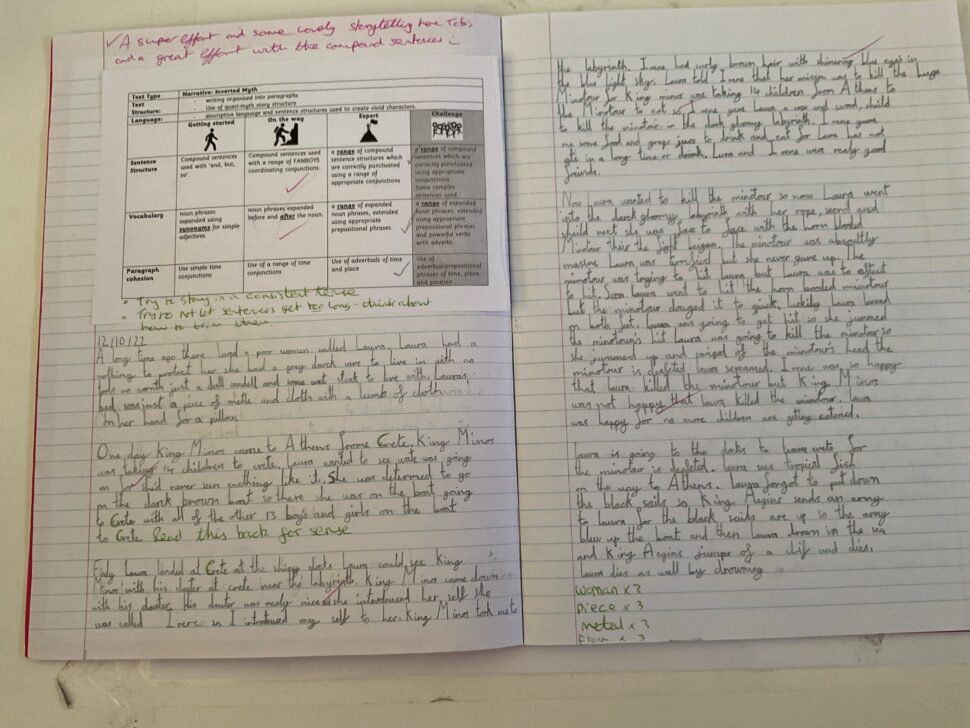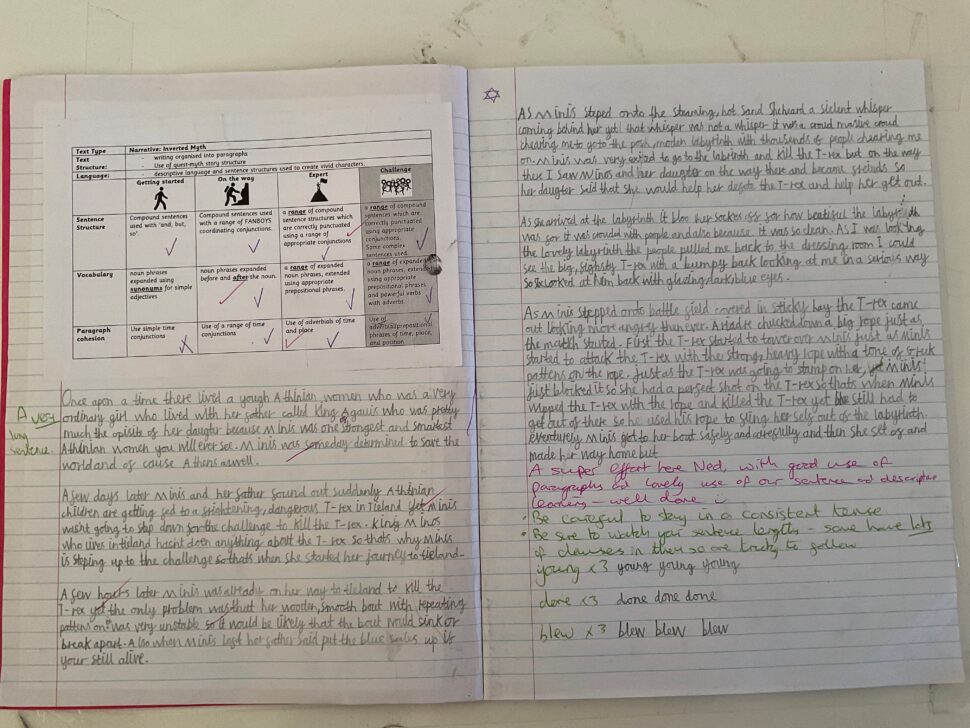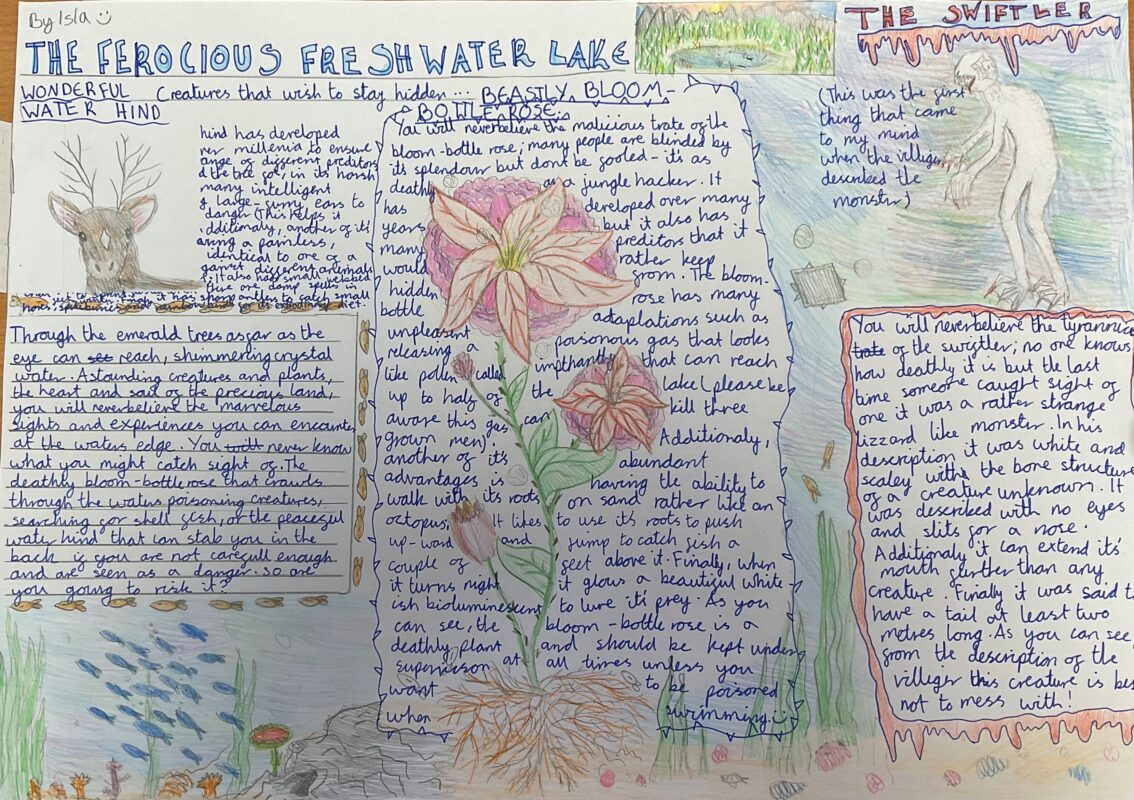
How writing links to our school vision.
Together
Our inclusive curriculum aims to:
Work collaboratively to analyse texts and examples so that children may understand the purpose and context of what they are writing.
Begin with genre examples and a rich variety of wider literature to inspire as well as support them.
Use effective and robust writing interventions to ensure that everyone can succeed in their writing learning.
Ensure that writing from all pupils is celebrated beyond the classroom.

Learn
Our carefully sequenced, balanced, interconnected curriculum aims to:
Create technical confidence in transcription, grammar and spelling as well as develop creativity, originality and flair.
Establish building blocks of effective transcription through high quality phonics, spelling and handwriting teaching.
Use genre examples so that children are clear on the purpose and context of writing.
Model how planning, revision and evaluation of writing are key to creativity of composition.
Make connections with children’s reading to widen and apply a wide vocabulary to their writing.

Grow
Our holistic, child-centred curriculum aims to:
Empower and inspire children to develop their own ideas.
Use inspiring and varied texts to build connections and instigate our own writing, developing awareness of different genres and styles and engaging with other cultures and viewpoints.
Apply writing skills across the whole curriculum
Recognise, promote and celebrate the use of writing as a means to hone in on children’s interests and passions as well as way in which they can effectively articulate and communicate their ideas and emotions.
Flourish
Our exciting, memorable curriculum aims to:
Set high expectations through the use of high-quality texts as examples to support and inspire.
Ensure that children have the necessary writing skills and confidence so that they may communicate effectively and become engaged and proactive citizens of the world.
Give a range of wider opportunities to inspire children’s writing.
To give pupils opportunities to polish, present and share their work so that they may look back on their writing with pride and joy.
Intent (Learn)
At Christ Church CE Primary School we believe that all pupils should be able to confidently communicate their knowledge, ideas and emotions through their writing. We want all pupils, regardless of ability, to have the opportunity to; acquire a wide vocabulary, a solid understanding of grammar and be able to spell new words by effectively applying the spelling patterns and rules they have learnt throughout their time at Christ Church. We want them to write clearly, accurately and coherently, adapting their language and style in and for a range of contexts, purposes and audiences.
The belief of all staff at Christ Church is that every child is encouraged to take pride in the presentation of their writing, in part by developing a good, joined, handwriting style by the time they move to secondary school. All good writers refine and edit their writing over time, so we want children to develop independence in being able to identify their own areas for improvement in all pieces of writing, editing their work effectively during and after the writing process. We understand the importance of parents and carers in supporting their children to develop both grammar, spelling and composition skills, and so we want to encourage a home-school partnership which enables parents and carers to understand how to enhance the skills being taught in school.
Implementation (Grow).
We teach English as whole class lessons, so that all children have access to the age-related skills and knowledge contained in the National Curriculum. Within lessons, teachers plan for targeted support for all pupils in order for them to achieve and produce learning, which is to the best of their ability, no matter their background. Opportunities are provided for pupils to extend their writing in a variety of ways, including through showing greater control in their writing, a deeper understanding of the impact that their writing has on the reader and by using a higher level of vocabulary and grammar features. Writing activities are planned to engage pupils: we use our knowledge of their interests, we plan cross-curricular links and ensure writing has a real purpose. Daily feedback provides all pupils with support on their learning journey as to their areas of strength and areas that need to be developed further.
During daily phonic sessions, pupils learn strategies to spell words and to formulate sentences. In reception and Key Stage One children are given daily opportunities to write freely within a particular genre and across the curriculum. This gives them the opportunity to become emergent writers.
We ensure our writers spend time preparing, mulling ideas over, finding out information, generating ideas and organising their thoughts before they start to write. They can then create simple, manageable plans to help them with the writing process. Pupils draft out their ideas, ensuring they rehearse sentences and parts of sentences to ensure it makes sense and to ensure there is a good flow. Pupils are encouraged to read aloud their writing and to work together to decide how writing can be improved.
We establish a positive climate for writing by providing pupils with,
We teach key spelling rules and introduce pupils to vocabulary that allows them to write imaginative and creative texts. Our teaching of sentence structure and grammar encourages pupils to become competent and mature writers. Opportunities for writing occur throughout the curriculum so that pupils learn to write for different purposes and audiences.
We are good at creating writing themes which are vibrant, fun and interesting for the writer – we like to involve the pupils when deciding writing topics.
Impact (Flourish).
The intended impact is that all pupils at Christ Church CE Primary School will enjoy writing across a range of genres. We want pupils of all abilities to succeed in all English lessons ensuring learning is appropriately scaffolded. All pupils will have exposure to a vocabulary rich environment in order for them to independently utilise in their writing in order to support their ability to adapt their writing based on the context and audience for the piece. We want our pupils to enjoy the writing process and to become confident life-long writers.
